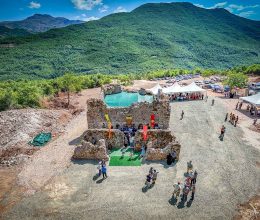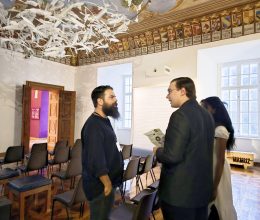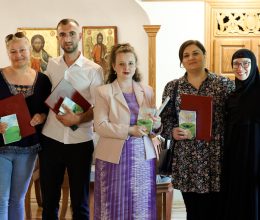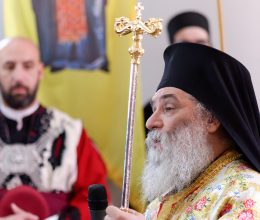Today, the Bigorski Monastery witnessed another joyful event – the promotion of the latest book by PhD. Vera S. Antich, called “The Eternal Lighthouse”. The book reflects the wonderful long-term cooperation of our Elder and Abbot, Bishop Parthenius, the monks and nuns, and the internationally renowned Slavic writer, a close friend of the Monastery, PhD. Vera Stojcevska Antich. The promotion took place at the beautiful Reception Hall of the Bigorski Monastery and was sealed with a warm and to the present guests a spiritually beneficial promotion. The book, which by God’s providence, is published exactly this year, when the Bigorski Monastery celebrates its millennium, was inspired by our Elder, Bishop Parthenius. In an inspiring way, the author follows his relentless struggle in the spiritual reconstruction of the Monastery, through the monastic everyday life, which she herself had the opportunity to experience during her numerous visits to the Monastery. The second part of the book is enriched with the personal testimonies of the monks and nuns, who recount their spiritual journey, and their graceful encounter with God. The Hieromonk Cyril, who had the honour to be involved in the project from its early stage, opened the promotion with a dignified speech, expressing his gratitude to the professor for inviting him to give a review of the book and to recall truly wonderful memories. He used this opportunity to read before the audience, the poem that Professor Antich dedicated to our Elder, Abbot and Bishop, entitled “The Icon of Bigorski”:
There is a tree with high branches, with a root plunged into a mountain stone. There is a stone fitted in the root And a root and a stone in a whole. The stone was endowed with sparks of the ages, sparks of fire, light and sun, freshness from the running and clear waters, from a chosen spring of holy waters, from the footsteps of our saints, invisible gifts under countless stars, in the sky right above a holy place, with the nocturnal whisper and the glow of fireflies, a monastery built by strains of gifts and preserved for eternity in a great mystery... Bigorski Monastery "St. John the Baptist", August 2011
After the review, Hieromonk Cyril announced with great respect the speech of the book author, PhD. Vera Antich. She shared with the audience in a close and honest way the motives behind the birth of this book – the strong connection that she always had with the Monastery, as well as the admiration and spiritual benefits of the precious friendship with the Bishop Parthenius and the brotherhood.
Moved by this heartfelt speech, our Elder and Abbot addressed the audience with his contemplation inspired by the passage he had the opportunity to read right before the promotion:
I would like to begin, my dear ones, with a warm welcome to my dear and respected friend, the professor Vera Stojchevska Antich, our beloved dochiar, the Hieromonk Dositeos, beloved fathers and brothers from our monastery, nuns from our convents, our dear Christian brothers and sisters and devout faithful present here.

I owe special gratitude to our esteemed professor Vera Antich for her manifested love and sacrifice for the Bigorski Sanctuary, which are clearly noticeable in the pages of her book with a very impressive title: The Eternal Lighthouse. Professor Vera was working on this book ten years ago, and when she finally gathered enough material, she insisted on my blessing for publishing: Father, please allow this material to be published so it can see the light of the day… At that time I did not give my blessing, because I knew that the time was not right, according to the words of King Solomon, who says: To every [thing there is] a season, and a time to every purpose under the heaven. A time to be born, and a time to die… (Ecclesiastes 3:1 – 3:3)
At the time when Professor Antich was writing the book, the monastic hospice was no longer visible for our physical eyes and there were only some remains of the main walls. However, that event did not reveal the spiritual building which has never stopped. It was exactly at that time when the professor resided with us and skilfully documented all these events. She wrote down the thoughts of the monks and the faithful, as well as the workers and visitors of the Monastery. So when she got familiar with their lives and their connection to Bigorski, her knowledge was carefully put together in this wonderful book that we have in front of us today.
I must admit that a lot of time has passed since these written testimonies were compiled and many moments described in this book have been forgotten. Recently, however, I came across a copy that I was looking through, reading excerpts from it. My attention was drawn to an interesting chapter, the testimony of a novice at the time, and now a monk from our fraternity. Also, she mentioned in her speech, when talking about my life based on the data she received from my parents, that from a young age I had a calling for a holy life. This is probably true, because, indeed, in my life as a young boy, I experienced many moments when God’s calling was very intense. I often seemed to be afraid of that voice, as if I wanted to avoid it, but it was stronger than anything. I was always attracted to the church, the interest in the Gospel gradually grew in me and I remember, as a child, I sometimes hid from my family so I could secretly learn by heart the prayers from my grandmother’s prayer book. Yet, I have met many different people to which God’s calling came at a later stage, no matter what their previous life was like. Those souls later accepted God’s voice in their hearts, realizing that they have been living away from God’s love where life has no meaning. This testimony of the novice from that time, speaks of such an example. He says, among other things: I lived and grew up without the knowledge of God and thus without the knowledge of true love. Ever since I was a child, I had an adventurous spirit, which came from my heart’s desire for sincere love, however, the world could not offer that. So, longing for true love, I went in the wrong direction; at that time I believed that real freedom and love could be found in pleasures, which I was not aware were false. But as time went on, I realized that the more I fulfil the sinful pleasures, the more my soul remained empty and of course, very distant from true love. I have become like the lustful son of the gospel story, with no more will to live, no more hope in my heart, not a single positive thought in my head. Today, the man who wrote this is among the monks of our fraternity and strives to lead an angelic life. May he be blessed and fulfil his monastic feat!

Father Cyril reminded us of today’s Gospel for the ungrateful vineyard husbandmen. Before the promotion started, a group of young people came to my reception room and we talked about this topic. At one point I asked them: “Who do you think are the husbandmen described in today’s Gospel?” One of the boys replied: “The Jews”. I continued: “Yes, it refers to the Old Testament Israel that rejected God, but what about others?” And replied immediately”: ”All of us – the hierarchs, the priests, but also every single Christian.” Because the term “vineyard refers to this wonderful world that God created and all the beauty in it left at our disposal, for our enjoyment. It is up to us now to be faithful and grateful husbandmen for the grace of the One Who planted the vineyard, Who created the whole visible and invisible world. We are His sons, the husbandmen of His vineyard, created in His image and likeness. And what do we do with that? Sadly, many times we behave like the ungrateful husbandmen described in today’s Gospel. With our deeds, with our lives, with the thoughts we have, with the wrong ideologies, as if we are saying to our Lord: We don’t want you to be present in our lives, we do not need you, we want to be free. But at the same time, we forget that freedom without Him is false freedom, as the former novice confessed. That kind of “freedom” is, in fact, the highest form of slavery. Without God everything is false. Here, we also mentioned the lustful son. What happened to the man when he wished to be without God? He began to feed his passions, which in essence can never be satisfied. That is why Christ says: And when he had spent all, there arose a mighty famine in that land; and he began to be in want. And he went and joined himself to a citizen of that country; and he sent him into his fields to feed swine. And he would fain have filled his belly with the husks that the swine did eat: and no man gave unto him. (Luke 15: 14-16). The distant land symbolizes the distance from God due to which man becomes spiritually poor and a slave to sin.
Therefore, my dear ones, let us work hard to be faithful heirs of God’s inheritance and guardians of the beauty that has been given to us. Let us keep Christ in our hearts as the greatest treasure. Because whoever finds God in his life, he does not need anything else, he becomes truly rich. Everything else in his life will take its rightful place. Our Lord Christ told us a very interesting story in the Gospel. Describing the Kingdom of Heaven, He compared it to a treasure: Again, the kingdom of heaven is like unto treasure hid in a field; the which when a man hath found, he hideth, and for joy thereof goeth and selleth all that he hath, and buyeth that field. (Matthew 13:44). At first glance, it seems strange to any reader: Why did he hide his wealth in the field? To sell everything you have and finally to bury it?! Very strange, indeed. At first, when I read this parable, it seemed strange to me, until I realized that the field, in fact, is our heart, and the treasure that man found is the Lord Jesus Christ Himself. And there is nothing greater than to have Him buried in your heart, as He Himself says: But seek ye first the kingdom of God, and his righteousness; and all these things shall be added unto you. (Matthew 6:33). If we seek the Kingdom of Heaven before anything else, we will not be deprived of anything.
Father Cyril, thank you for calling me the father of this monastery, as you and the other brothers of this Monastery feel. I, myself, consider unworthy of the invocation and therefore I only ask for your prayers and support, so that I may remain a faithful and grateful husbandman of Lord’s field for the rest of my life. Interesting enough, this book is promoted after ten years on the very Sunday when Christ’s parable of the vineyard is read, and in the year when the Monastery celebrates its millennium of existence, and when I, the unworthy, became Bishop. This made me think of the High Priest’s prayer which the hierarch says at the Holy Liturgy while blessing the people with two and three candles: Lord, O Lord, look down from heaven! See and visit this vineyard and bring it to perfection, for your right hand has planted it. Now my responsibility is even greater. There is almost no Liturgy served without tears in my eyes. In my life, I have experienced what it means to carry the weight of a lot of people on your back. One of the elements of the hierarch’s liturgical vestment is called omophorion. It is the long white vest that one of the priests carries during the great entrance at the Liturgy, and the bishop takes it and puts it on himself, on his neck and shoulders. Namely, the omophorion symbolizes the fallen and lost men that Christ takes on His shoulders in order to carry them on the way to salvation. In fact, there is such an iconographic representation, in which our Saviour is depicted carrying a lamb on His shoulders. That lamb represents all of us that got lost in the world of passions. The monks here are familiar with the dogmatic sticheron in the 4th voice which says: You have been made Mother and Mediator of Life by God Himself, Who choose to become human through you and to restore our dignity from the dirt of the passions and sins and after finding the lost sheep in the mountain and taking it on His shoulder, to return it to the Father and by His will to take it back it to the Kingdom of Heaven.
It is wonderful to talk about God; it is even greater to live in His yards singing the verses of the psalm: How amiable are thy tabernacles, O Lord of hosts! My soul longeth, yea, even fainteth for the courts of the Lord: my heart and my flesh crieth out for the living God. (Psalm 84: 1-2). The Lord, my dear monks and nuns, has made us worthy of living in this Sanctuary. I only say this because Bigorski is where the monastic life started and this monastery became the mother of the rest of our sanctuaries. As for you, dear faithful, who do not live here permanently, always remember the words of our dear professor. Sharing her wonderful thoughts about our faith and God, among other things, she emphasized that although there is no possibility to come as often as she wants, she is spiritually always here among us. You should all live like that – dwell here with your spirit and constantly have God in your thoughts.
Dear Professor, once again I thank you infinitely for this wonderful work and for the beautiful words, and thank you all!
God bless you!
A review by the Hieromonk Cyril Bigorski
Dear readers, lovers of the word and pilgrims of the Holy Bigorski Monastery
Today you have in your hands a book not so large in pages, but far more larger in content and spirit, which has become an inseparable part of our 1000 years history. In fact, this is indicated by its name – The Eternal Lighthouse. In this short title, we find two equally inexplicable terms: Eternity and Light. Both are consistent with the content they express, a small excerpt from the daily life of the Bigorski Monastery dedicated to the Forerunner St. John the Baptist.
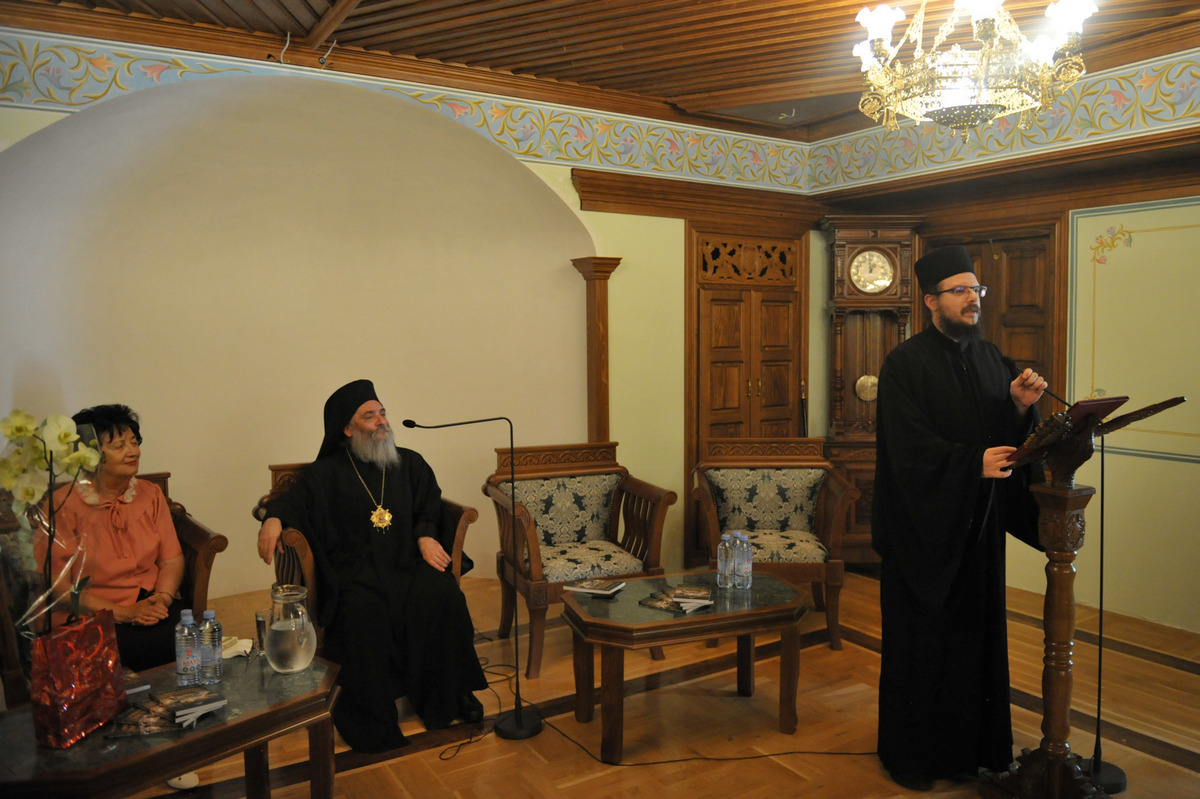
This book, derived from the enlightened thoughts and the inspirational word of our much appreciated Slavic scholar and writer PhD. Vera Stojchevska Antich, covers the events of the monastic life in our Monastery in the period of several months in the year 2010 and 2011, as seen from the perspective of a scientist, with insightful thought and noble spirit. However, although these pages describe events from less than ten years ago, by God’s providence they have been published in the year when The Eternal Lighthouse – Bigorski Monastery, celebrates a millennium since its founding by the first Archbishop of Ohrid, St. John of Debar. This great jubilee is complemented by another one, no less important than the first: the 25th anniversary since the beginning of the renewal of Bigorski with the arrival of our current Elder and Abbot Parthenius, Bishop of Antania. Under whose wise guidance and spiritual leadership the Monastery lives its resurrection, rebirth and its enlightenment reaches the highest point. And it is no coincidence that the main emphasis in these pages written by the beloved professor is placed on the person who, in her opinion is the living icon of Bigorski Monastery, our Elder Parthenius, to whom she wrote a song with the same title.
I had the honour to be the closest collaborator of Professor Antich at the time when these pages were written, and though being still as a novice, to directly participate in the shaping of this work into a memoir. As her guide in the monastic events, with the blessing of Elder Parthenius, I had the opportunity to witness her thoughts, concepts, views, doubts, solutions. It has been a great privilege and a very unique experience. Consequently, today I am especially honoured that the professor asked me – the undeserving, to do a review of her work.
This book is an exceptionally written and faithful testimony of the monastic life up to 2010/11, especially since PhD. Vera Antich stayed at the Bigorski Monastery for a long time and had the opportunity to participate in the life of the monks, believers and the visitors. This gives additional value and depth to the whole work. Apart from the memoir moments, her work is abundant with numerous conversations, excerpts from other works, descriptive notes, as well as personal writings of the members of the Bigorski fraternity and of the sisterhood of “St. George the Triumphant” Convent in Rajchica. The Eternal Lighthouse is a literary monument not only for the monastic community at Bigorski and Rajchica but also for the entire Orthodox literature in general. This written monument, decorated with the well-spoken narrative of Professor Stojchevska-Antich and with the noble inspiration of her thoughts, abounds with very interesting factual data and unique personal stories, guided by God’s omniscient providence.
All the above inspires my modest affection, so I would wholeheartedly recommend this book to all spiritually eager readers.
With the blessing of our Elder, Bishop of Atania Mr Parthenius, Abbot of the Holy Bigorski Monastery.
The speech of PhD. Vera Stojchevska Antich
A speech by a PhD. Vera Stojchevska Antich delivered at the guest hall, during the promotion of her book The Eternal Lighthouse dedicated to the Bigorski Monastery.
Your Eminence, esteemed Abbot of the Bigorski Monastery and my spiritual father Mr Parthenius,
Dear monks, nuns and guests,
I am very honoured by your presence at this wonderful gathering and grateful for the opportunity to be among you now. It is a great pleasure for me that right here, at the Bigorski Monastery, my book The Eternal Lighthouse, which was inspired by this very place, is now being promoted and dedicated to the resurrection of this millennial sanctuary and to my spiritual father, Bishop Mr Parthenius. Back in 2015, at the consecration of the fully restored monastic hospice, I was honoured with the “Forerunner” medal of merits as a reward for my activities at the Monastery.
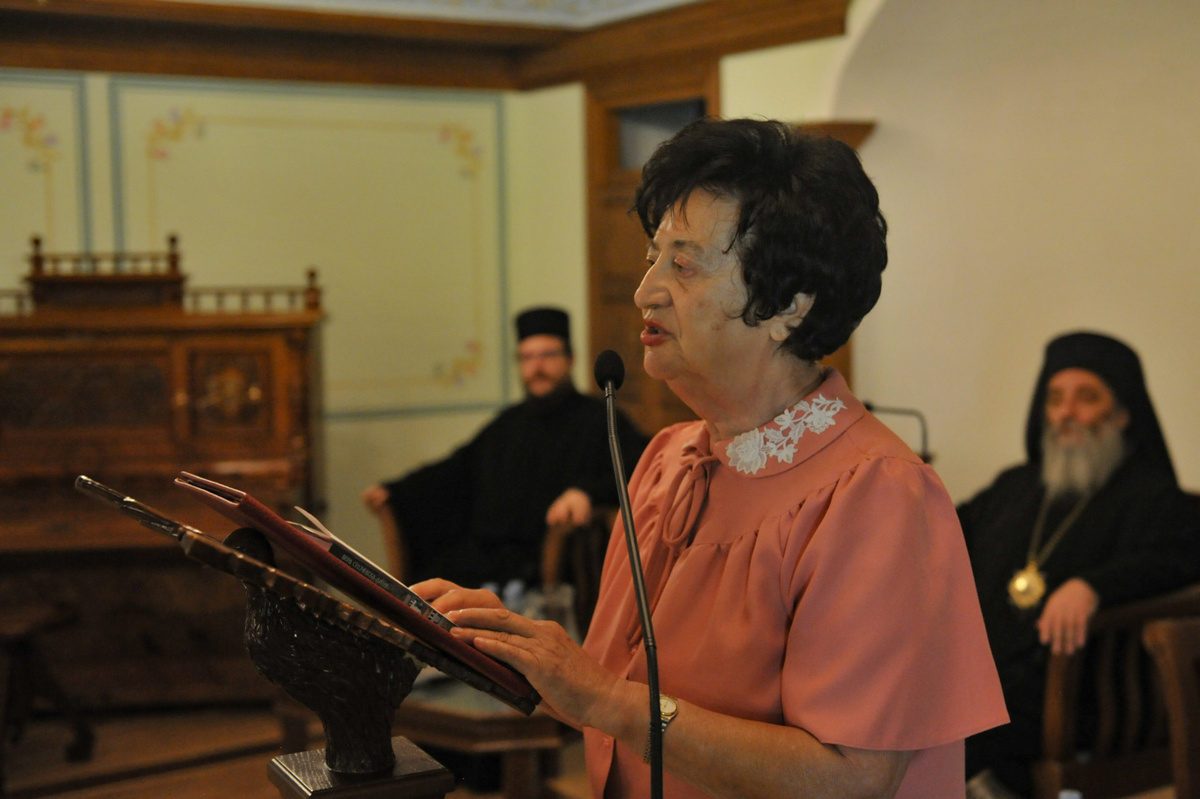
Being among you today, I would like to try to explain what I felt at the Bigorski Monastery. I was born in Bitola and raised in a Christian family. I had the privilege to grow up near the church “St. Demetrius” and the “40 Martyrs of Sevastia” Chruch at the place called Krk-Kardash. When I moved to Skopje, I found myself missing that kind of environment. So the first time I visited the Bigorski Monastery, I found some connection with these sacred buildings and it brought me back to my childhood. I was amazed by the architecture and the location of the sanctuary. Back in 1968, when I was chosen for the position of an assistant at the Philology Faculty in Skopje, I was made responsible for the pearl of this Monastery – its manuscripts. It was my first scientific appearance at an international symposium… Furthermore, I felt some kind of longing and attachment to the Monastery and started to take my students there on a regular basis. We were coming regularly to read the seminar papers, dedicated to the Monastery. The students were always amazed by what they saw and what they learned and that was a special joy for me.
But upon my closest encounter with the Monastery in the period when Bishop Parthenius came and restored it, I realized why even today the sanctuary has the same profound importance and glory as it did through the past centuries.
One day at the Monastery I met the mother of Elder Parthenius, and I learned something that was deeply imprinted on my soul and my heart. She told me that when Bishop Parthenius was about 10 years old, while on a holiday in Greece together with his family, the young boy saw an icon of the Most Holy Mother of God in a shop window. He wanted to take the icon with him and stood in front of the shop window without moving. He entered the shop and he went out again, evidently overcome by the strong desire to have the icon. His parents were short of money at that moment and left, taking the child away from the shop window. He wept sadly so his parents had to come back to the shop, but it was already closed. Then the owner opened the door and asked them why the child was crying. His mother explained to him that he wanted the icon of the Most Holy Mother of God, however, they did not have enough money to buy it. So the seller went in and brought him the icon. The child was so happy that he carried the icon tightly on his chest. I took this as a sign that there was something ever since your birth, dear Bishop Parthenius, which remains as a precious heritage, that is still cherished today…
While staying here and getting to know the brotherhood of this Monastery and the sisterhood of the Rajchica Monastery, I literally became united to these Christ-loving souls and every time I left the Monastery, I felt that I was entering a different world not even remotely close to the one at the monastery.
Something else that left a huge impression on me is the fresco at the entrance of the church. The ladder, to me personally, represents a depiction of how all the monks and nuns have a goal to reach the Heavenly Heights and the Kingdom of God. That fresco is always with me, it lives in me because it is a real picture of spiritual growth and rising of the monks to Heaven, as they have given their vows. There are many other memories of the Monastery however the joy of the monks and their smiling faces simply brings me back to them and I strongly believe that all of its inhabitants have found their rightful place.
Although I am physically distant from the monastery and have not been here for a long time, I am constantly present here in spirit and feel united with my spiritual father, Bishop Parthenius, who is always with me. I would like to point out that this is not a coincidence at all and that it is a spiritual heritage, especially since this is how I was brought up in the Christian faith from an early age. However I must add that, attending 3-4 years of preschool at the French College in Bitola and the Catholic Church where I regularly went, I fell in love with the nun Sir-Marie, my teacher, with whom we prayed to God before every lesson and every breakfast. When she prayed and looked up at the sky with her beautiful blue eyes, I felt that she was not here among us anymore. And my earliest wish about what I wanted to be, was that I would rather have followed the footsteps of Sir-Marie and be a nun like her. And that feeling has been with me all my life. In my latest book, which has now been published, I write with whole honesty as nowadays there is no fear of expressing our religious opinion, unlike the past. I follow through all the stages of my life: childhood during the war, childhood in the French college, childhood in the newly formed state after 1945 when it was forbidden by certain teachers to enter a church. However, my parents kept telling me: “You can be forbidden anything but never the Church”. I complied with that attitude and now wrote my latest book: Seeking God.
Thank you to Bishop Parthenius for allowing this promotion and thank you all for coming in such large numbers. I honestly hope that we will have many other pleasant meetings in this wonderful Monastery.
Thank you!
